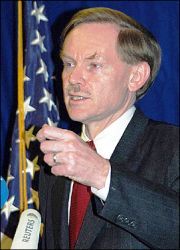Darfur action key to ending US sanctions – Zoellick
By Opheera McDoom
KHARTOUM, July 9 (Reuters) – U.S. Deputy Secretary of State Robert Zoellick said a new unity government in Sudan was a step towards improving ties with Washington, but action to end the conflict in Darfur was needed for sanctions to be lifted.
<

|
|
U.S. Deputy Secretary of State Robert Zoellick addresses a news conference in Khartoum Thursday, April 14, 2005. (AFP). |
Zoellick attended the swearing in on Saturday of former southern rebel chief John Garang as first vice president, marking a new era after two decades of north-south civil war.
But he said a southern peace deal signed in January needed to extend to a separate conflict in the western region of Darfur.
“It’s an important day in terms of the formation of the government of national unity,” Zoellick said. “But it’s equally important that we connect it to the events in Darfur and indeed to the challenges of peace and stability throughout all of Sudan.”
Zoellick said the lifting of U.S. economic sanctions, imposed on Sudan in 1997 as a “state sponsor of terrorism”, had been brought up by his Sudanese counterparts in discussions.
But he said Washington was not ready to accept an immediate end to the sanctions, despite the end of the southern civil war.
“The intensity of the opinion in the United States about first the events of the north-south trouble that killed over two million people but now most importantly the genocide in Darfur are so strong that, while I see a path for improving relations, we need to do so step by step,” he said.
Tens of thousands of people have been killed in Darfur and more than two million forced from their homes since a rebellion broke out in early 2003. The rebels accuse the government of neglect and of arming Arab militia to loot and burn non-Arab villages, a claim which Khartoum denies.
CEASEFIRE
The International Criminal Court is investigating alleged war crimes in the region, but a U.N.-appointed commission stopped short of the U.S. assertion that the violence constituted genocide.
Zoellick said he was happy with a 3,000-strong African Union force monitoring a shaky ceasefire in Darfur, and saw no need for Western troops to deploy there.
“The role of NATO is one of transportation and logistics (in Darfur),” he told reporters in Khartoum. “There’s been no interest in NATO and no interest in my country of having Western forces on the ground.”
An international think tank has recommended the NATO alliance deploy up to 12,000 troops to stop violence in Darfur, to give the AU time to build additional forces.
Sudan says it will only allow African forces to deploy in Darfur. NATO has said it would airlift extra African troops to the region, but has not said it would send its own forces.
Frosty U.S. ties with Khartoum, which hosted Osama bin Laden from 1991 to 1996, reached a low in 1998 when Washington launched missiles at a pharmaceuticals plant it said was linked to bin Laden and making ingredients for chemical weapons.
Zoellick, visiting Sudan for the third time this year, said a new coalition government, which should be agreed by President Omar Hassan al-Bashir and Garang within 30 days, was the next step towards normalising relations with Washington.
“I think the new government of national unity creates an opportunity for President Bashir and First Vice President Garang… to take the steps that will improve relations.”
But he warned that actions such as harassing non-governmental organisations (NGOs) in Darfur and the closure of newspapers would harm that process of normalisation.
